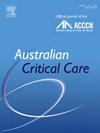COVID-19大流行期间重症监护室护士重新部署经验:一项定性研究
IF 2.6
3区 医学
Q2 CRITICAL CARE MEDICINE
引用次数: 0
摘要
背景:大流行应对需要大规模重新部署护士,以支持COVID-19患者的护理。对员工的调查和对员工反馈的分析表明,频繁重新部署重症监护室(ICU)注册护士(RNs)会导致不满,并导致自愿减少工作时间和增加辞职意向。虽然对在高需求期间将非ICU注册护士重新部署到ICU以支持患者护理有很多了解,但对ICU注册护士被重新部署到普通病房的经验知之甚少。当ICU床位可用时,ICU注册护士经常被要求在其他领域工作,以弥补组织内的人员短缺。目的:本研究的目的是探讨ICU注册护士在2021年和2022年期间重新部署到医院病房的经验。方法:采用半结构化访谈对澳大利亚墨尔本一家主要卫生服务机构的三家医院的26名ICU注册护士进行描述性定性研究。参与者于2023年7月接受采访。使用反身性专题分析对采访录音进行了分析。结果:根据数据构建了6个主要主题和12个次要主题:(i)风险(次要主题:缺勤,对患者不利- icu和病房);(ii)选择(分主题:别无选择,ICU的安全);(iii)迷失(次要主题:缺乏方向,对一切都不熟悉);(iv)痛苦(分主题:临床和情绪压力);一个数字(分主题:低估、不公平);(vi)积极的观点(副主题:良好的体验,必须发生,帮助)。结论:ICU注册护士转出ICU的经历以负面为主。然而,在工作人员短缺期间同事的支持和为病人提供护理的机会方面,也注意到积极的方面。调查结果强调了重新部署的相关风险及其对ICU和更广泛的卫生服务的影响。建议的策略包括通过入职培训实践实施,采用可持续的团队护理方法,以及优先考虑员工的福祉。本文章由计算机程序翻译,如有差异,请以英文原文为准。
Intensive care unit nurses’ redeployment experiences during the COVID-19 pandemic: A qualitative study
Background
The pandemic response required the large-scale redeployment of nurses to support the care of patients with COVID-19. Surveys of staff and analysis of staff feedback indicated that the frequent redeployment of intensive care unit (ICU) registered nurses (RNs) led to dissatisfaction and contributed to voluntary reductions in hours and increased intentions to resign. Whilst much is understood about the redeployment of non-ICU RNs into ICUs to support patient care during periods of high demand, less is known about ICU RNs’ experiences of being redeployed to general wards. ICU RNs are often required to work in other areas to cover staff shortages within the organisation when ICU beds are available.
Aim
The aim of this study was to explore ICU RNs’ experiences of redeployment to hospital wards during 2021 and 2022.
Methods
A descriptive qualitative study using semi-structured interviews with 26 ICU RNs was conducted at three hospitals within a major health service in Melbourne, Australia. Participants were interviewed in July 2023. Transcribed audio recordings of interviews were analysed using reflexive thematic analysis.
Results
Six major themes and 12 subthemes were constructed from the data: (i) risk (subthemes: absenteeism, bad for patients—ICU and ward); (ii) choice (subthemes: no choice, security of the ICU); (iii) lost (subthemes: lack of orientation, unfamiliar everything); (iv) distress (subthemes: clinical and emotional stress); (v) a number (subthemes: undervalued, unfair); and (vi) positive perspectives (subthemes: good experience, has to happen, helping out).
Conclusion
ICU RNs’ experiences of redeployment out of the ICU were predominantly negative. However, positive aspects were noted regarding the support of colleagues during staff shortages and the opportunity to provide care to patients. The findings highlight the risks associated with redeployment and its impact on both the ICU and the broader health service. Suggested strategies include implementing through orientation practices, adopting a sustainable team nursing approach, and prioritising staff wellbeing.
求助全文
通过发布文献求助,成功后即可免费获取论文全文。
去求助
来源期刊

Australian Critical Care
NURSING-NURSING
CiteScore
4.90
自引率
9.10%
发文量
148
审稿时长
>12 weeks
期刊介绍:
Australian Critical Care is the official journal of the Australian College of Critical Care Nurses (ACCCN). It is a bi-monthly peer-reviewed journal, providing clinically relevant research, reviews and articles of interest to the critical care community. Australian Critical Care publishes peer-reviewed scholarly papers that report research findings, research-based reviews, discussion papers and commentaries which are of interest to an international readership of critical care practitioners, educators, administrators and researchers. Interprofessional articles are welcomed.
 求助内容:
求助内容: 应助结果提醒方式:
应助结果提醒方式:


